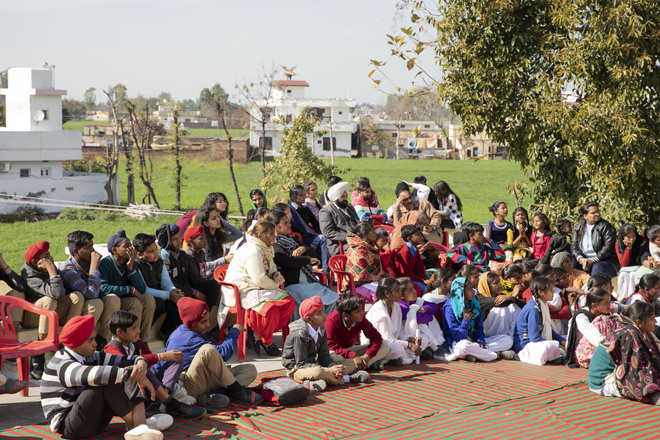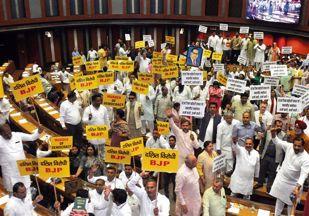
Students and residents from nearby villages as well as visitors form the audience at a concert of traditional music on the terrace of Preet Nagar residency.
Vishav Bharti
“The press is ready. A few houses have been rented for accommodation in Lahore’s Model Town,” read Gurbaksh Singh Preelari’s letter to novelist Nanak Singh. In the early months of 1938, the letter alerted other prominent writers that they will soon be requested to move in with their families. Two years ago, Gurbaksh Singh, the University of Michigan-trained civil engineer, had left his job as a railway engineer in Naushehra and moved to Lahore. It was here that he began discussing the idea of making an ideal village, where ‘all animals will be equal’. He purchased 200 acres of land for Rs 40,000 in the middle of Lahore and Amritsar and the dream to build Punjab’s first planned rural socio-cultural township begun to take shape in Lopoke village. He named it Preet Nagar, the town of love.
On June 7, 1938, a caravan comprising Gurbaksh Singh, Nanak Singh, Harbhajan Singh, Deen Dayal, Kartar Singh, Piara Singh Siharari and Piara Singh Data moved to this nondescript place. Soon the town started buzzing with community kitchen, collective farming, activity school and open air theatre. Initially eight houses were built, each housed two families. Later, actor Balraj Sahni, painter Sobha Singh, writer Kartar Singh Duggal and publisher Bhapa Pritam made Preet Nagar their home. The great grandmother of Punjabi theatre, Norah Richards and poet Amrita Pritam were frequent visitors here. That moved Pt Jawaharlal Nehru so much that he couldn’t hold back his eagerness to see it and visited in 1942.
In the past eight decades, the town has born many rough weathers. First, construction was stopped at Preet Nagar due to World War I, then Partition proved fatal, during which even Gurbaksh Singh temporarily moved to Delhi. The hostility on the border and militancy turned the beautiful dream to dust. Punjab’s renaissance town was left to fend for itself, but the old and young from the family of the ‘great dreamer’ have for several years tried to revive it.
First step in that direction was The Gurbakhsh Singh Nanak Singh Foundation formed in 1999 and led by his son Hirday Paul Singh. It organises various functions every year. Gurbaksh Singh’s grandson Ratikant Singh and his wife, Poonam, (the editor of Preetlari) along with their two daughters have left Chandigarh to stay at Preet Nagar and are making efforts to rejuvenate the town by offering residency programmes for artists and holding various activities like annual melas.
These efforts have given hope to many, who were earlier witnessing the demise of this town. Punjabi writer Mukhtiar Gill, who joined as a teacher in school 1968, fell in love with the place and settled here, says that even if it is slow, dawn is breaking. “For the writers of my generation, Preet Nagar was just like a pilgrimage site. Activities in the recent years have given hope that that all is not lost.”
Balbir Parwana, literary editor of Punjabi newspaper Nawan Zamana, says, “More than the structures of concrete, Preet Nagar will always be remembered for its glorious past. It will be remembered for the courageous dreams of Gurbaksh Singh who pushed the imagination of an entire generation.” He says had the successive governments paid even a little heed to its contribution, the town could have been in a much better shape today.
Sukirat Anand, maternal grandson of Gurbaksh Singh, who is member of the foundation, and organises a function at Preet Nagar in the memory of his father, journalist Jagjit Singh Anand, and mother, writer Urmila Anand, says individual efforts to save any heritage will always have some limitations. “Institutions like universities should come forward to preserve such places. When I was a student in the erstwhile Soviet Union, I remember universities would organise trips of students to villages of Russian writers like Pushkin, Gogol, and Tolstoy, etc.”
“We,” he says, “shouldn’t forget that Preet Nagar is a town that was inhabited by writers who laid the foundation of modern Punjabi literature. Here, we have three universities. Can’t they even hold one function in a year at the town which was inhibited by the father of Punjabi prose and father of Punjabi novel?” The teaching of literature even in universities seems to have been reduced to classrooms, he rues.
Gurbaksh Singh had started looking the death of his dream town during his life time. After spending two years in Delhi during Partition when he decided to come back Preet Nagar, none except Nanak Singh responded. Hirday Paul Singh recalls that looking at the abandoned Preet Nagar then, he had said: “Now only ruins of a dream are left.” Will the future be different? It can be.
Inside Preet Nagar
- A complex titled Preet Bhawan, an auditorium with modern facilities was built.
- An award function in the memory of journalist Jagjit Singh Anand and writer Urmila Anand takes place on March 24.
- The Preet Nagar Resdiency Programme was started in 2013 and has been attended by about 200 residents since then.
- A weeklong ‘The Mela Preetnagar’ was organised last month



























